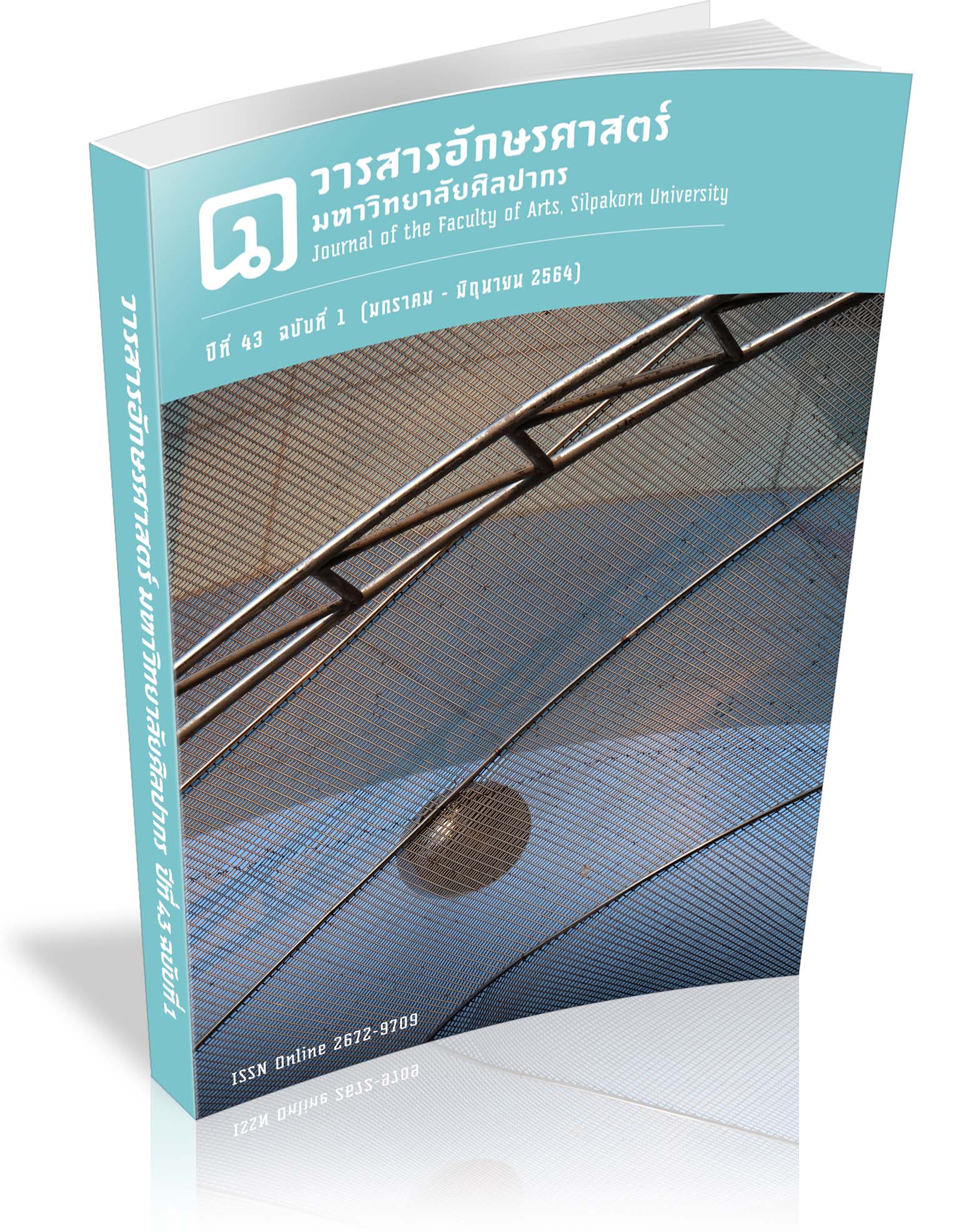Impact Assessment of Flash Flood on the Tourism Sector : A Case Study of Nan Province
Keywords:
Flash flood, Impact assessment of tourism, Flash Flood Potential Index, GIS, Nan provinceAbstract
The aims of the present study are to evaluate the ‘at risk’ areas to flash floods in Nan using the Flash Flood Potential Index (FFPI) and to develop an impact assessment of tourism model. Key effective elements of tourism to flash flood risk were included in the damage assessment model operated on Geographic Information Systems (GIS). The results show that the most susceptible areas to flash floods are located in the northern part of Nan, consisting of Mueang Nan, Pua, Song Khwae, Bo Kluea, and Thung Chang districts. These areas are on steep slopes and receive the highest average annual rainfall. In regards to the impact assessment of flash floods on the tourism sector, Du Tai, Chai Sathan, Pha Sing and Nai Wiang sub-district of Mueang Nan district, Muang Tuet and Fai Kaeo sub-district of Phu Phiang district and Pua sub-district of Pua district are the most notable areas because they are clustered with valuable tourist attractions and accommodation. Our findings may guide stakeholders to develop strategies for early warning systems, establishing guidelines on hazard mitigation and damage protection for tourist sites and tourism-related sectors.
Downloads
References
Burby, RJ. & Wagner, F. (1996). Protecting tourists from death and injury in coastal stroms. Disasters, 20(1), 49-60.
Committee of Disaster Prevention and Mitigation Division, Nan Province. (2020). Incident action plan for flood windstorm flash flood and Landslide in Nan province 2020. Retrieved 25 August 2020, from http://nan.disaster.go.th/cmsdetail.nan-8.23/39473/menu_130/59.1/แผนเผชิญเหตุอุทกภัยจังหวัดน่าน+พ.ศ.+2563
Jakkrapan, R. (2012). Factors negative Affecting impact to domestic travel of Thai tourists. Master Thesis, Master in the faculty of economics studies, Chiang mai university, Thailand.
Janejira, B. (2012). Travel motivation and satisfaction of Thai tourists towards Nan province. Master Thesis, Master in the faculty of Arts studies, Dhurakij pundit university, Thailand.
Kobkiat, P. & Chaiyapong, T. (2012). Watershed runoff forecasting for a flash flood watch and warning systems development. The 17th national convention on civil engineering. pp WRE024-1 - WRE024-8, May 9-11, 2012. Udon thani, Thailand.
Land development department. (2009). Land use classification. Bangkok: Policy and planning division, Land development department.
Ministry of tourism and sports. (2020). Tourism statistics. Retrieved 3 March 2020, from https://www.mots.go.th/more_news_new.php?cid=411
Nan provincial statistical office. (2015). Situational analysis report for spatial data preparation in Nan province. Retrieved 11 October 2018, from http://osthailand.nic.go.th/masterplan_area/userfiles/file Download/Report Analysis Province/รายงานวิเคราะห์สถานการณ์จังหวัดน่าน.pdf
Nardnarade, A., Praman, T. & Warut, N. (2009). A study of determine incidence of flood risk area factors using geographical information systems and prevention guideline around Western sub-basins area of Songkhla lake in Phatthalung province. Inthaninthaksin journal, 3(21), 176-199.
Naroumon, P. & Supasit, K. (2013). Land use and hydrologic soil group classification for the Yang River basin in Northeast Thailand. KKU ENGINEERING JOURNAL, October-Decamber 40(4): 473-483.
National statistical office. (2015). The 2016 hotels and guest houses survey. Bangkok: National statistical office.
Praparsri, S., Warawud, R., et al. (2014). The study of the potential and value on tourism product for increasing income of Uttaradit, Phare, and Nan province in Northern part of Thailand. Bangkok: Thailand science research and innovation (TSRI).
Pongsak, W. et al., (2011). Community based research on flash flood and land slide warning at Mae Na sub-district, Chiang dao district, Chiang mai province. Bangkok: National research council of Thailand.
Ray, K & Joseph, C. (2020). Flash flood potential index for WFO Mount Holly/Philadelphia. Retrieved 9 January 2020, from http://bgmresearch.eas.cornell.edu/research/ERFFW/ posters/kruzdlo_FlashFloodPotentialIndexforMountHollyHSA.pdf
Rensis, L. (1967). The human organization: Its management and value. New York: McGraw-Hill.
Rouse, J. W., Jr. & Haas, R. H., et al. (1974). Monitoring vegetation systems in the Great Plains with ERTS. Proceeding of Third earth resource technology satellite-1 symposium, Greenbell: NASA SP-351, Pace flight center, Washington D.C., 10-14 December, 309-317.
Roxana, T., Gabriel, L. & Iuliana, L. (2018). Modified flash flood potential index in order to estimate areas with predisposition to water accumulation. De Gruyter journals, 10, 593-606.
Smith, G. (2003). Flash flood potential: Determining the hydrologic response of FFMP basins to heavy rain by analyzing their physiographic characteristics. Retrieved 3 July 2018, from http://www.cbrfc.noaa.gov/papers/ffp_wpap.pdf
Sonrawit, V., Marqueza, C. R. & Matthew, S. (2016). Disaster risk assessment guide. Bangkok: United nations development programme.
Thailand trade machinery & electronic. (2011). The impact of the 2011 flood on the industrial sector and the Thai economy. Retrieved 12 August 2019, from https://ttmemedia.wordpress.com/2011/12/06/ผลกระทบน้ำท่วมปี-2554-ต่อภา/
Thai meteorological department. (2020). Flood. Retrieved 4 February 2020, from https://www.tmd.go.th/info/info.php?FileID=70
Thomas, A. S. (2006). Stormwater management for land development: method and calculation for quantity control. Hoboken, N.J.: John Wiley.
Downloads
Published
How to Cite
Issue
Section
License
ผู้เขียนบทความต้องยินยอมในข้อกำหนดต่าง ๆ ของวารสารก่อนส่งบทความตีพิมพ์



